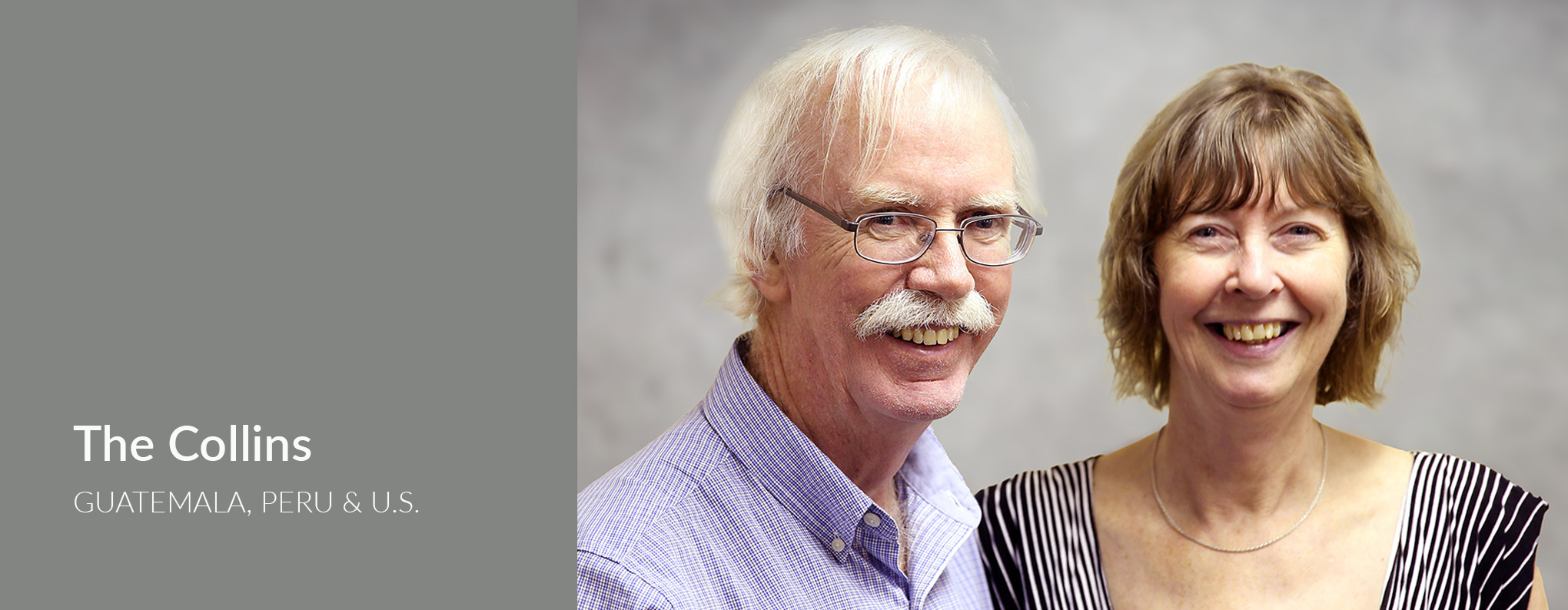
The Collins Family
Collins Family May 2014 Update
Dear and good friends,
Greetings from Wake Forest. A little weather lesson. In Ohio we have virtually no autumn. It goes from late summer to winter in a matter of days. The colors are wonderful--but they are short-lived and usually appreciated only under a bed of thick frost, snow or ice. Wake Forest, on the other hand, has no spring. It goes directly from winter to summer. This week it has been in the mid-90's and has been for days. Nancy enjoys not running the air conditioner. She feels that breezes and natural air temperatures are good for the mind and body. So sometimes I swelter, but for a good cause.
We won't be hot for long. I just got back from three weeks in Venezuela's southernmost state--Amazonas--just a few degrees latitude north of the equator, and 95 degrees pretty much every day, and Nan and I leave in the morning for two months in Peru. Peru is in the southern hemisphere, so it's heading toward winter, not with sledding and snowmen, but quite gray and cool nonetheless.
Our time in Venezuela was exciting. We met with village leaders from five different language groups, and instead of talking about how linguistics could help them, we just asked a bunch of questions about how they pictured the future of their language and culture. Were adolescents picking up the language and appreciating the culture, or were they casting these off for a more urban and urbane lifestyle? Of course, people and cultures will do what they think is best for themselves and their kids, but many of these people are seeing their cultures and languages slip away, and they'd like to turn the boat around. To maintain the metaphor, in many cases around the world, the boats are not only being swept away by the strong currents of globalization, but they are leaking badly and in danger of going down.
We talked to these leaders about their doing some research on how their language seems to be doing back in their villages and how they are faring in the face of Latino music, Spanish literature, cable and satellite TV, schools, national and regional politics (where their languages are not understood), Spanish newspapers, radio, and lots of other forces that work against their language's vitality and longevity. When they came back and shared their findings, they found that most adults are generally alarmed that some of their kids have trouble communicating with their grandparents. What will happen to the wisdom of those who are no longer heard? Language is the repository of the world's humanity and knowledge. Words carry meaning and relationships and promise. And many of these people feel helpless in the current. They are seeking help, and have hooked up with people who care about them as people--image bearers of God--and as people who can still make a difference as to whether or not their languages and way of life will survive. We had a staff of nine, and we worked with 21 Indians over the span of two weeks, and we all learned a lot. One group wanted to produce a primer so that they could teach their people, young and old, to read. But what are they going to read besides the primer? So they talked about creating indigenous literature. But their language doesn't have an official alphabet, which is now in the offing. So getting from point A to B is hard enough with a lot of preliminary steps that they hadn't consdidered, and in addition they have leaky boats and strong currents to contend with.
Some of the staff are Venezuelan scholars, some are linguistics professors, like me, and some are CILTA grads, students who have studied linguistics in order to have something to share in just such opportunities. All the staffers are committed believers in Christ and who believe that His message is still relevant for cultures big and small.
This work goes on in our absence, and our former students visit the leaders in their communities and try to help them get and keep things going.
As far as CILTA training in Lima, we have 18 students from seven countries (Argentina, Chile, Colombia, El Salvador, Mexico, Peru and Venezuela) awaiting us in Lima. Classes start on Tuesday for us, although the students have already been in class for two months. I'm teaching phonology, a course crucial to designing a practical alphabet. The course will meet ten hours per week. They will also study Semantics, a course in meaning, which is critical to those who hope to translate the Scriptures into presently unwritten, or under-written languages. These students want to work in cross-cultural settings, like the one we just left in Venezuela. It is a great joy to us to help move them toward that goal. Nancy helps with the details and much of the finances. She also is sought out by most of the women students who ask what it's really like raising a family far from home.
Should we care about Indians in such predicaments? Wouldn't they be better off speaking only Spanish--or better yet--English? Maybe. But at what cost? Languages and cultures are the bearers of God's image and His Word. Jesus became one of us. He shared our bread and our words and our history. Christian philosopher, Francis Schaeffer, said that there are no little people. Everyone matters. All the languages count. And when people hear the grace of the Gospel in their own language, it eliminates the linguistic bullying of the monster languages like Spanish and English and Chinese. Imagine what it must be like to hear that God cares for you as an individual, but you have to get the Message in another language, because nobody cares about yours. This isn't right--nor effective.
If you've read these updates for a long time, you know that this is my guitar with a single string. But it can still make music. God is that way. He cares about and provides for the fallen sparrow and the lost sheep, and the culturally ailing and the bewildered. May we be there for others and with the Good News of the God who cares about such matters.
We'll be gone for a while but we are usually accessible by e-mail, so feel free to keep in touch. We enjoy news from home.
God's best to you all.
Wes, and for Nancy
